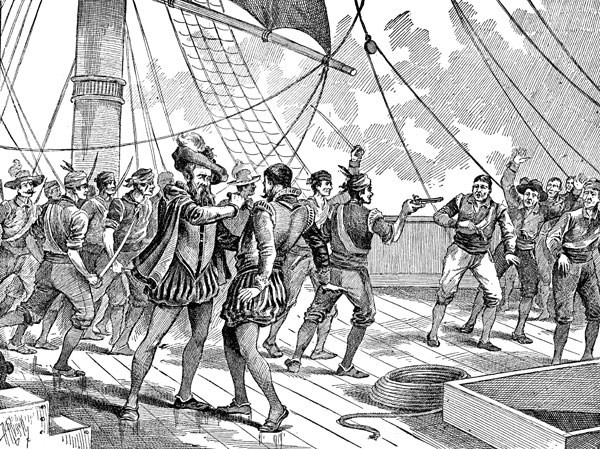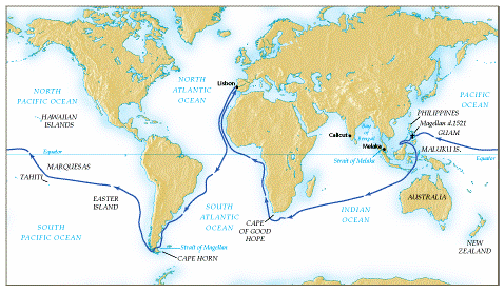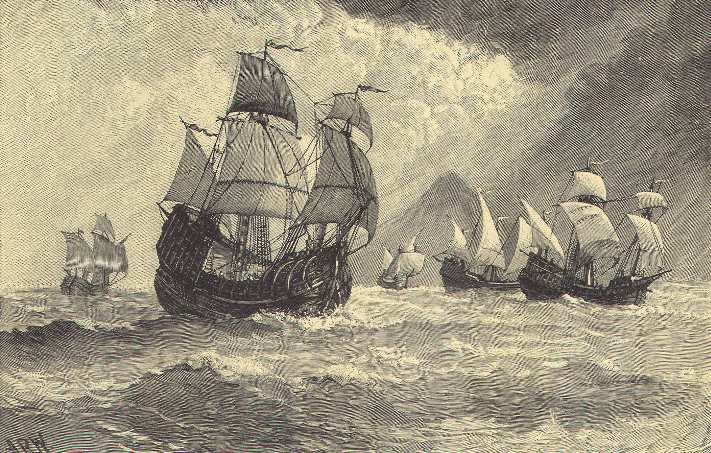 |
| Ferdiand Magellan (http://www.emersonkent.com/ history_notes_from_9_1401.htm) |
The captain and his crew toil and suffer on the vast ocean. They starve, and water surrounds them endlessly in all directions. The sailors struggle in this unknown sea; the captain stands on his one and last leg at the end of his rope. But "when you come to the end of your rope, tie a knot and hang on" (Franklin D. Roosevelt). Ferdinand Magellan could not have done that better: he kept his ships and crew together, and completed the first crossing of the Pacific Ocean. This stands as just one of many, momentous feats Magellan accomplished. Born in Portugal, 1480, he served in a Portuguese fleet when he was twenty-five, from 1505 to 1513. During this time period, Magellan campaigned through a multitude of battles along the African and Indian coasts. In 1517, Magellan began to serve Spain. At this point in his life, Magellan presented his plan for a major voyage that would change the understanding of the globe. In 1519, Magellan embarked on that journey: the world's first circumnavigation. Although many people opposed this expedition, Magellan conquered them all with stronger will. The voyage still consisted of many perils for Magellan, but he persisted through them with relentless determination. Magellan put himself through all of this nobly and of his own volition. Throughout his valiant career as a soldier and a sailor, Ferdinand Magellan proved himself a hero because of his selfless acts for the good of others, his strong will against those who opposed him, and his perseverance through harsh circumstances.
 |
| (http://ushistoryimages.com/ferdinand-magellan.shtm) |
By enlisting as a sailor and a soldier, Magellan put his life at risk in military operations for his benevolent passion to serve others. For example, during his early days as a soldier, Magellan "took part in the decisive naval battle off Diu in 1509, when the Egypto-Gujerati counter-offensive was shattered; he was probably with Albuquerque in the first assault on Goa in 1510, and certainly at Malacca both in 1509, when he rescued Francisco Serrão, and for the successful siege of 1511" (Spate). Simply through his participation in Portugal's fleet during a time of war, Magellan showed his willingness to serve his country. He took orders and followed them not for selfish reasons, but because he wanted to do what Portugal needed him to. Not only that, but Magellan also went beyond aiding his country in the battle. He risked his own life to save a friend's. Demonstrating selfless character and valor, Magellan clearly performed a heroic act of gallantry. Later, when Magellan began to serve Spain, he "proposed to sail west to give practical proof... that the Spice Islands lay... within the Spanish, not the Portuguese, hemisphere. Magellan was convinced that he would lead his ships from the Atlantic to the'Sea of the South' by discovering a strait through Tierra Firme (the South American mainland)" (Mitchell). Magellan voluntarily embarked on this voyage. He made the proposal to King Charles I of Spain by his own will. Also, Magellan undertook this expedition to essentially support Spain. This proves that Magellan wanted to serve his benefactors, and it shows how selflessly he acted through his life. On top of that, what Magellan proposed to do consisted of numerous difficulties: crossing the Atlantic Ocean, finding a strait, crossing the Pacific Ocean, and enduring a multitude of other problems. Each challenge would be arduous and challenging to overcome, and the journey, therefore, terrified and intimidated many. Yet, Magellan willingly put himself up against this for Spain. He had even died for the journey, on April 27, 1521; he did all of it for the good of others. Magellan courageously took great risks to stand not only for his allies, but also against his enemies.
 |
| (http://coursesa.matrix.msu.edu/~fisher/HST140_2008/MapMagellan.html ) |
Even though Magellan had multiple powerful foes opposing him, he faced all of them strongly with an iron will. Through his time in battles, Magellan endured many crushing hardships: "In India, Magellan lost his investment in trade. In Morocco, his horse was killed in battle. His requests to the king [of Portugal] for compensation were refused. Charges of treason and corruption against Magellan for actions taken in Morocco were not reviewed by the king at Magellan's request... [Magellan] was deeply distressed; his pride was wounded, his reputation insulted, and his ambition thwarted... Magellan asked the king if he could offer his services to another kingdom... A month later, Magellan arrived in Seville [Spain]" (Benjamin). Suffering through these troubles in battle left Magellan irate and empty; misfortune had ruined his life. However, Magellan remained unbroken and continued with his life; displaying his unbending character, he sought compensation from the king. Unfortunately, Magellan did not receive his reward due to prejudice and unfounded reasons. Magellan lost his chance for relief, and he was left in a much worse position than before, both emotionally, and prospectively for his future. But again, his strong will drove him forward in life. He committed himself to serve Spain instead; Magellan could not have done this without his indomitable spirit. Because of that, he continued his seemingly hopeless life. Magellan's strong will also proved effective against others during the voyage when his authority was challenged: "During the night the conspirators, led by Juan de Cartagena and Gaspar de Quesada, took over the San Antonio, Victoria, and Concepcion... Magellan sent a small party with concealed arms to the Victoria, ostensibly to arrange a conference; her captain Luis de Mendoza was stabbed without warning, and the ship seized, to join with the loyal Trinidad and Santiago in blocking the harbour mouth" (Spate). Magellan acted quickly and decisively to crush the rebellion. He would not allow the conspirators to take over, displaying his strong will as captain. Magellan remained determined to preserve the voyage. His actions against the mutiny carried practical thought and finishing intent. Although Magellan reacted brutally and deceivingly, the rebellion Magellan struck down the mutiny and kept firm control over the voyage. necessitated his counter. If he had not struck hard the way he (http://ushistoryimages.com/ferdinand-magellan.shtm) did, Magellan would have lost his ships to the mutiny. He would have been forced to end the voyage and fail his country. However, because of Magellan's strong will, he thwarted the conspirators, kept everything together, and prevented disaster. He cannot be blamed for acting with deception. By remaining resolute, as a hero needs to be, Magellan overcame powerful forces as well as severe obstacles.
 |
| (http://www.mainlesson.com/display.php) |
He surmounted numerous discouraging hardships through his perseverance and emboldening character. One of these challenges took months to complete--finding and crossing what became known as the Strait of Magellan: "A great storm came on the night of their departure, and it was feared that they had been lost, until they... found a great opening... obviously running far into the land...Estevao Gomes ... objected to continuing the voyage: now that a passage had been discovered, it would be better to return to Spain and come out again with a better-found expedition... Magellan was not unreasonable in finding the proposal utterly unacceptable" (Spate). Discovering and crossing the strait loomed as one of the most strenuous parts of the journey. This in itself took much perseverance. Magellan and his crew had no specific information on the strait's position, and it would take enormous effort to find. Magellan gave that effort and persisted for over five months to discover the strait. However, because of the drawn-out and dreadful delay in locating it, many of the crewmembers became discouraged, and the fleet still had to cross through the strait. When Estevao Gomes, an indignant sailor, suggested quitting, Magellan strongly disagreed. He knew that to quit would mean to lose all of their progress and restart the project from scratch. Magellan's persistence to continue the journey saved them from this and kept the voyage going. However, right after crossing the strait, the fleet then faced the arduous and grueling challenge of crossing the unknown Pacific Ocean: "Tortured by thirst, stricken by scurvy, feeding on rat-fouled biscuits, and finally reduced to eating the leather off the yardarms, the crews, driven first by the Peru Current and throughout the voyage by the relentless determination of Magellan, made the great crossing of the Pacific... The voyagers on March 6 made first landfall at Guam in the Mariana Islands, where they obtained fresh food for the first time in 99 days" (Mitchell). Magellan's fleet crossed the Pacific Ocean before anyone. Consequently, they suffered from lack of preparation; no one knew the vastness of the Pacific Ocean. Magellan and his crew had to endure over three months of anguish. Nevertheless, Magellan's perseverance pushed everyone each day of the voyage. He inspired his crew like a hero, drove them forwards, and plunged boldly through the daunting obstacles. Without Magellan's persistence, the fleet never would have finished the journey. This directly proves how Magellan's tenacious character led himself and others to glorious accomplishment. Throughout his voyage, Magellan faced consecutive disheartening difficulties, but his perseverance pulled him and his crew through these struggles. The colossal route of Magellan's journey. (http://coursesa.matrix.msu.edu/~fisher/HST140_2008/MapMagellan.html)
Magellan established a strong imprint in history as "a man short in stature but impressive, gallant and resourceful in action, at once realistically calculating and daring, capable both of generosity and violence, independent in temper, secretive and over-taciturn, and very dogged as to his rights. His whole life shows him as a tough leader, driving men hard because driven by his own daemon. Even as a junior officer, he was capable of dissenting in open council" (Spate). Magellan possessed control over his actions. He made selfless decisions based on his beliefs, and, lawful or chaotic, had the grit to excel in his choices. Magellan mastered self-control, judgment, and determination to flourish through obstacles. A hero needs these traits to succeed, and Magellan's life and journey prove this. His voyage, for example, "was an expedition of many 'firsts.' It was the first voyage to pass from the Atlantic Ocean to the Pacific Ocean through what came to be known as the Strait of Magellan, the first European voyage to cross the Pacific Ocean, the first European 'discovery' of the Philippines, and--most famously--the first circumnavigation of the globe" (Benjamin). Magellan braved a journey with no precedent; he took daring steps, and in turn, uncovered much information for Europe. From him, one can learn to innovate and try new things. Taking risks will benefit society as a whole. And, with strong will and perseverance, one can fully explore fresh ideas that would enhance our technology, science, and exploration. Society has thrived because of men like Magellan with no mental limits. They leave an undying significance to the world that influences lives forever. In fact, Magellan has inspired me to think innovatively in my everyday tasks to overcome obstacles of life. His character undoubtedly embodies that of a hero. As he and his crew suffered in the Pacific Ocean, Magellan had the courage to persevere and change the world; he tied a sailor's knot, and hung on.
Works Cited
Benjamin, Thomas. "Magellan, Ferdinand." Encyclopedia of Western Colonialism since 1450. Ed. Thomas Benjamin. Vol. 2. Detroit: Macmillan Reference USA, 2007. 745-747.
Gale Virtual Reference Library. Web. 7 Dec. 2011 Mairin, Mitchell.
"Magellan, Ferdinand." Britannica Biographies (2010): 1. History Reference Center. Web. 7 Dec. 2011. Spate, Oskar Hermann Khristian.
"The Spanish Lake." ANU E Press. ANU E Press The Australian National University Canberra ACT 0200, Australia, 2004. Web. 07 Dec. 2011.
Page created on 1/15/2012 1:35:11 PM
Last edited 9/8/2018 3:45:07 AM
